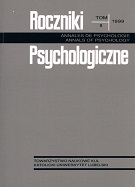Psychospołeczne uwarunkowania aktywności samopomocowej: umacnianie osoby, grupy i wspólnoty
Psychosocial Conditions of Self-help Activity Empowerment of the Person, Group and Community
Author(s): Andrzej JurosSubject(s): Psychology
Published by: Towarzystwo Naukowe KUL & Katolicki Uniwersytet Lubelski Jana Pawła II
Summary/Abstract: Currently, we can observe a crisis of self and its respective weak ties with a group and lack of community bonds. All these make it that on the one hand there is a need for professional help, and on the other the effectiveness of such help is rated as low. The manners of empowering both he person, group and community are sought. We deal with such empowerment, among other things, at the level of self-help groups. Yet the source of that success should be sought not so much in the phenomenon of a group as in the very person and his activity. It is the person who thanks to his indispensable abilities can overcome biological and social limitations. Owing to self-help activity the person develops his abilities and frees himself from the sense of helplessness, powerlessness and hopelessness. The phenomenon of selfhelp activity requires that a new role and competence of the psychologist (and not only him) be defined in relation with self-help groups. On the one hand, he must be capable of arousing confidence in particular persons and groups to himself, to his own competencies, to use their own resources. On the other hand, he must be able to organize, facilitate and animate those social processes in which the division into the giving and the taking will be overcome. The reconstruction of a sense of community that is well underway in the self-help groups is an initial condition by which to join the broader trend of constructive social activities.
Journal: Roczniki Psychologiczne
- Issue Year: 2/1999
- Issue No: 1
- Page Range: 125-148
- Page Count: 24
- Language: Polish

